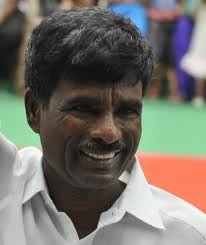
Udupi, July 23: Muzrai Minister Kota Srinivas Poojary on Sunday morning assured Chief Minister Jagadish Shettar, of giving befitting answer to the queries on the government order for performing poojas seeking the blessings of the raingod, to be raised during the question and answer session in the assembly on Monday.
Replying, over phone, to Shettar in the middle of a press conference after the inauguration of his district in charge minister's office, at the DC Office Complex, End Point, Manipal, Poojary said he had already made his stand clear during the interviews on TV news channels, and the media persons had been convinced of the government stand.
He told press persons: “When as many as 135 taluks of Karnataka have been affected by drought, many social, social organisations and MLAs have been working for the rehabilitation. All the departments of the state have been striving to give their best. Agriculture department is supplying seeds, rural development department might provide for supply of water and revenue department can dispense compensation. Likewise, what if the religious endowment and muzrai department passed an order to offer poojas in the temples coming under it. Moreover the government has not releases even a single paise for that and all the temples will not spend Rs 5,000 each. The have been given a upper limit of Rs 5,000. Some wealthy temples may spend Rs 5,000 each. Some other financially poor temples can offer poojas by spending just Rs 100-200''.
The order for offering poojas is neither for fancy nor for any political mileage, he added.
Replying a question on shortage of funds for preventing sea erosion, Poojary said, as the project of constructing sea walls was included in the ADB project, no funds were earmarked for that. But the funds would be sought from the government for constructing temporary sea walls, he added.





Comments
Add new comment